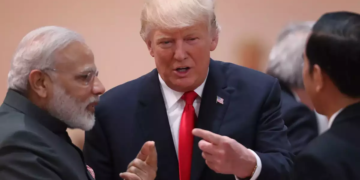U.S. President Donald Trump’s Support for the DGOE’s Cancellation of India’s $21 Million Aid Package
The recent decision by the Department of Government Efficiencies (DGOE) to cancel a $21 million (₹182 crore) aid package aimed at increasing voter participation in India has stirred significant debate. U.S. President Donald Trump has publicly endorsed the move, emphasizing that India, as a rapidly growing economy, should not rely on U.S. financial assistance.
Trump’s position is clear: India’s economic strength, bolstered by high tax revenues and tariffs, renders such aid unnecessary. “Why should we give India $21 million? They have plenty of money. It is one of the highest-taxed countries in the world, and their tariffs are very high,” Trump remarked. While he expressed his respect for India and Prime Minister Narendra Modi, he stressed that the U.S. should not subsidize efforts to boost voter turnout in India.
The decision was made public on February 16th by the DGOE, a government body led by entrepreneur Elon Musk. The agency justified the cancellation by citing concerns over the responsible use of American taxpayer funds. The DGOE stated that it would halt all similar aid programs in the future, signaling a broader shift in how the U.S. engages with foreign electoral processes.
This move has ignited political discourse within India, with both the ruling Bharatiya Janata Party (BJP) and the opposition Indian National Congress (INC) seizing the opportunity to accuse one another of enabling U.S. interference in India’s democratic processes. The BJP and INC are both keen to frame the decision as a reflection of the broader geopolitical context, where foreign influence on domestic elections has long been a sensitive topic.
The aid package, which was intended to assist with increasing voter engagement, has now become a flashpoint in the ongoing debate about foreign assistance and national sovereignty. Trump’s support for the cancellation has also sparked criticism in India, where some view the decision as an unwarranted intervention in their electoral system. However, Trump’s justification—rooted in the notion that India’s economic resilience negates the need for foreign aid—reflects the broader U.S. administration’s focus on prioritizing domestic concerns over international spending.
While Trump’s stance may be appealing to certain segments of the American electorate, the fallout from this decision could have far-reaching consequences for U.S.-India relations. Both countries have long shared strong diplomatic ties, and while this issue might not strain their relationship immediately, it adds a layer of complexity to future dealings on matters of aid, trade, and cooperation.
In conclusion, Trump’s support for the cancellation of the $21 million aid package represents a significant moment in U.S. foreign policy, raising questions about the role of the United States in funding international democratic initiatives. As the situation unfolds, the political ramifications will likely continue to spark debate both within India and the U.S.



















